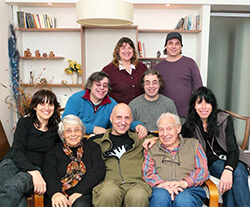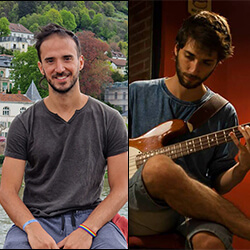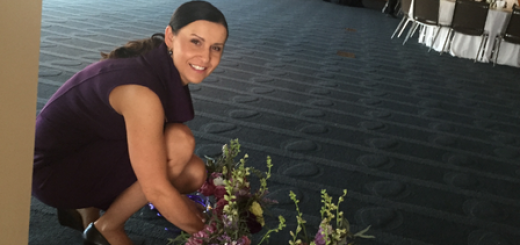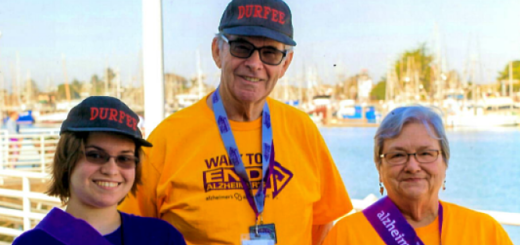Hispanic caregiver promotes brain health through song
By Gina Carnago
Dani Macri, a fellow for the Global Brain Health Institute (GBHI), recalls his experience caring for his grandfather, who died after living with Alzheimer’s disease for four years. Dani felt the call to help people using his talents as a musician. His experience caring for his grandfather led him on a journey to raise awareness for the disease. He and his brother, Martin, came together to produce a sentimental song, “Coco,” based on their experience caring for their grandfather.
A passion for people
Dani’s maternal grandfather, Horacio “Coco” Etcheverry, was an inspiration for him. Coco was an engineer who was a dedicated family man. Dani said, “His passion was always the people: his children, his nephews, his grandchildren.” Coco deeply loved his wife and family and everybody knew it.
Coco’s passion for his family was coupled with his passion for knowledge. He worked on developing his wisdom and spirituality, but he also dedicated a lot of his time and interest to music, teaching his family to appreciate the art as well.
It was no surprise that years later, Dani would play tangos for his grandfather, who could still recognize an incorrect tune despite the dementia diagnosis. Dani said, “He couldn’t remember many things, but [of] those he did, the music was very much part of it.”
Alzheimer’s in the Hispanic community
Coco was diagnosed with Alzheimer’s disease when Dani was just 21 years old. His grandfather, who was in his 90’s, started to show signs of the disease like confusion and difficulty following conversations. Dani mentioned that as his family noticed his grandfather’s lack of recognition, “the word that we used was that he was kind of ‘lost.’”
At this time, Dani was still living near his family in Buenos Aires, Argentina. Initially, Dani and his family assumed that the symptoms his grandfather was showing were just the normal signs of aging. Later they learned they were actually signs of dementia.
The signs of Alzheimer’s disease were the most noticeable to Dani when he was in school, “Because I was always studying, he was asking ‘Do I also have to go to this exam?’” Dani would take the time to remind his grandfather that he had already graduated and reassure him that he did not have to attend the test.
Approximately 13% of Hispanics who are 65 or older have Alzheimer’s or another dementia and are 1.5 times more likely to have the disease than Whites. Dani himself noted, “I considered [the signs my grandfather was showing] as normal aging at that point, I didn’t realize that [it] was a disease.” This is a common belief among the Hispanic community, with almost 6 in 10 believing that a significant loss of memory or cognitive abilities is a normal part of aging.
Providing care as a family
The disease impacted not just Dani but his whole family. “There is a lot of training that we, as people [caring for] people with dementia, need to have somehow,” said Dani. “Because [for us] it is a new disease, a new experience, a new part of life.”
Dani’s family spent a great deal of time deciding who was best suited to care for Coco and the responsibility fell to Dani’s aunt, Ana. Dani, Martin, Martina (their mother) and other family members would take turns visiting Coco throughout the week in order to give Ana a break.
When Dani was with his grandfather he helped with mobility and getting his grandfather food and water. Dani was able to spend sentimental time with his grandfather that he’s grateful to have to this day.
“The last time I saw him, it was a Friday,” said Dani. “[My] grandma sang with my aunt and I played the guitar and it was such a nice moment. My grandma and aunt danced. Grandpa started singing. I was so honored to have that possibility. I said goodbye and [a few days later] he had died. I was so grateful to have had that last moment with him.”
Writing a song
Caring for a family member with Alzheimer’s disease is a new experience for many caregivers. The experience was an emotional one for Dani and Martin. Martin often wrote down his feelings as well as what he was learning from his grandfather and the situations that he found himself in. Using this, the brothers worked together to produce and create a song based on the experiences that the two of them faced together. The song was called, “Coco,” after their grandfather.
The process of writing “Coco” was an emotional one for Dani and Martin. Dani noted that he was not able to listen to the song without tearing up. Dani said, “After reflecting on what Alzheimer’s is, what dementia is, what working with [the] aging populations is, what working as a caregiver is, I thought the song would be a good opportunity to get others to know [this information]… if the song is expressing how we feel, it can relieve ourselves from our burden and make us feel accompanied.” The brothers hope that they are able to bring a sense of community and understanding to those who hear the song as well.
Music and brain health
Dani has had the opportunity to present the song as a fellow for the Global Brain Health Institute (GBHI). He began working with GHBI as a project engineer. Through his work with GHBI, Dani was able to receive additional training on brain health and realized how relevant his work as a musician was to the GHBI initiatives.
Much of the work that Dani had been doing was related to brain health initiatives, especially within the realms of prevention development and community building. Dani used his professional connections to further use his creative abilities as an advocate for people living with Alzheimer’s disease, and their caregivers.
Sharing his song
As a fellow for the GBHI Dani was able to share his song with others who found comfort in the song as well. “Coco” works to grow a community for caregivers. Dani said, “I used it to start workshops with caregivers where they would share their experiences.”
Additionally, in collaboration with French neurologist and GBHI fellow, Agathe Vrillon, the pair combined the song with a brain health educational talk in a senior center in San Francisco. Through this they were able to spread more awareness about the disease.
Currently, Dani is working on a project to share the song with a wider audience. “The project involves presenting the song in different opportunities so I could sing the song here at the Alzheimer’s International Conference in San Francisco… also at the Memory Aging Center.”
Since then, Dani has been looking to continue to share his song with an even larger community with the hopes of helping even more people. Dani’s work with the GBHI is available online and anyone can listen to “Coco” in English or Spanish, on Spotify.
For tips and tricks on being a caregiver visit alz.org/caregiving.
To learn more about dementia in the Hispanic community visit alz.org/Hispanic or visit our Spanish language website at alz.org/Espanol
For more information on how to reduce your risk of Alzheimer’s or another dementia check out our tips at.alz.org/help-support/brain_health




















